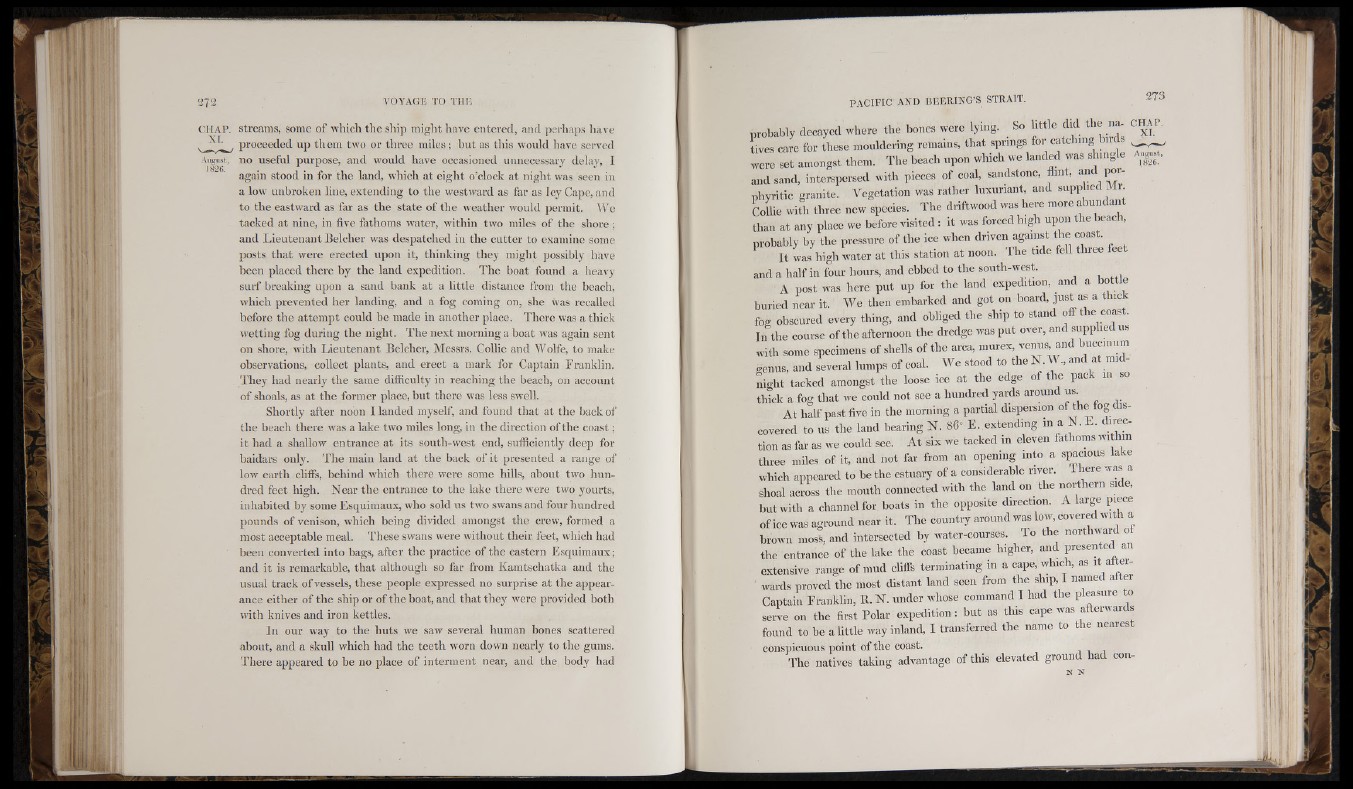
'I
ikiui
CH AP . streams, some of whicli the ship might have entered, and perhaps have
' , proceeded up them two or three miles ; but as this would have served
-iiipst, no useful purpose, and would have occasioned unnecessary delay, I
again stood in for the land, ivhich at eight o'clock at night was seen in
a low unbroken line, extending to the w’estward as far as Icy Cape, and
to the eastward as far as the state of the weather would permit, YVe
tacked at nine, in five fathoms water, ivithin two miles of the shore ;
and Lieutenant Belcher was despatched in the cutter to examine some
posts that were erected upon it, thinking they might possibly have
been placed there by the land expedition. The boat found a heavy
surf breaking upon a sand bank at a little distance from the beach,
W’hich prevented her landing, and a fog coming on, she was recalled
before the attempt could be made in another place. There was a thick
wetting fog during the night. The next morning a boat was again sent
on shore, with Lieutenant Belcher, Messrs. Collie and Wolfe, to make
observations, collect plants, and erect a mark for Captain Franklin.
They had nearly the same difficulty in reaching the beach, on account
of shoals, as at the former place, but there was less swell.
Shortly after noon I landed myself, and found that at the back of
the beach there was a lake two miles long, in the direction of the coast;
it had a shallow’ entrance at its south-west end, sufficiently deep for
baidars only. The main land at the back o f it presented a range of
low earth cliffs, behind which there were some hills, ahout tw’o hundred
feet high. Near the entrance to the lake there were two yourts,
inhabited by some Esquimaux, who sold us tw'o swans and four hundred
pounds of venison, which being divided amongst the crew, formed a
most acceptable meal. These swans were without their feet, which had
been converted into bags, after the practice of the eastern Esquimaux;
and it is remarkable, that although so far from Kamtschatka and the
usual track of vessels, these people e.xpressed no surprise at the appearance
either of the ship or of the boat, and that they were provided botli
with knives and iron kettles.
In our W’ay to the huts we saw several human bones scattered
about, and a skull which had the teeth worn down nearly to the gums.
Tliere appeared to be no place of interment near, and the body had
probably decayed where the bones were lying. So little did the na CHAP.
tives care for these mouldering remains, that springs for catching birds
were set amongst them. The beach upon which we landed was shingle u g .
and sand, interspersed with pieces of coal, sandstone, flint, and jmr-
phyritic granite. Vegetation was rather luxuriant, and supplied M .
Collie with three new species. The driftwood was here more abundant
than at any place we before visited ; it was forced high upon the beach,
probably by the pressure of the ice when driven against the coast.
It was high water at this station at noon. The tide fell three feet
and a half in four hours, and ebbed to the south-west.
A post was here put up for the land expedition, and a bottle
buried near it. We then embarked and got on board, just as a thick
fog obscured every thing, and obliged the ship to stand offthe coast.
In the course of the afternoon the dredge was put over, and supplied us
with some specimens of shells of the area, murex, venus and buccinum
genus, and several lumps of coal. We stood to the N . W„ and at midnight
tacked amongst the loose ice at the edge of the pack in so
thick a fog that we could not see a hundred yards around us
At half past five in the morning a partial dispersion of the fog discovered
to us the land bearing N . 86“ E. extending in a N. E, di.ec-
tion as far as vve could see. At six we tacked in eleven fathoms within
three miles of it, and not far from an opening into a spacious lake
which appeared to be the estuary of a considerable river. There was a
shoal across the mouth connected with the land on the northern side,
but with a channel for boats in the opposite direction. A large piece
of ice was aground near it. The country around was low, covered with a
brown moss, and intersected by water-courses. To the northw-ard of
the entrance of the lake the coast became higher, and presented an
extensive range of mud cliffs terminating in a cape, vrtiich, as it alte -
wards proved the most distant land seen from the ship, 1 named after
Captain Franklin, R .N . under whose command 1 had the pleasuie to
serve on the first Polar expedition; but as this cape w’as afterwards
found to be a little way inland, I transferred the name to the nearest
conspicuous point of the coast.
The natives taking advantage of this elevated ground had coii